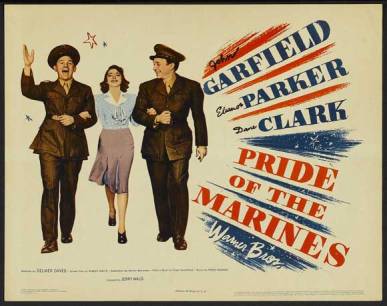
Producer Lynn Novick once called the generation that fought World War Two “reticent,” and this is absolutely true. These men believe that they’re no one special, and that they went to war because they knew they had a duty to defend their nation. Most of them weren’t career soldiers but regular guys who went off and did something they probably had never dreamed they were capable of, and millions upon millions of fascinating stories have resulted. One of the most famous of these in that time was that of Private Al Schmid, whose experiences were ably and movingly portrayed by John Garfield in the 1945 film, Pride of the Marines.
Al Schmid is a native of Philadelphia who boards with his friends, Jim and Ella Mae Merchant, (John Ridgely and Ann Doran). Schmid is a welder who prides himself on his independence and toughness, but Ella Mae can’t resist setting him up with women. The first time we see Al he’s pulling up to a house on the 6500 block of Tulip Street and getting out of his car with a big bouquet of flowers for Ella Mae and Jim’s anniversary. Much to Al’s chagrin, Ella Mae has invited her friend Ruth (Eleanor Parker), who just happens to be single, to dinner. Al is suspicious, but when Ella Mae tells him Ruth is a terrific bowler, he’s intrigued.
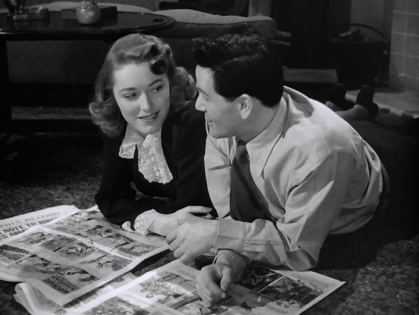 As it turns out, though, Ruth is the furthest thing from a terrific bowler, and Al gives her some grief about trying to hook a husband. Ruth calls Al a drip and storms out, leaving Al stunned. Not being used to a woman giving his guff right back to him, Al starts pursuing Ruth, and they fall in love. Their romance isn’t the typical lovey-dovey stuff, but playfully combative banter that’s fun to watch.
As it turns out, though, Ruth is the furthest thing from a terrific bowler, and Al gives her some grief about trying to hook a husband. Ruth calls Al a drip and storms out, leaving Al stunned. Not being used to a woman giving his guff right back to him, Al starts pursuing Ruth, and they fall in love. Their romance isn’t the typical lovey-dovey stuff, but playfully combative banter that’s fun to watch.
Since it’s 1941, Pearl Harbor looms. So many of the movies made about the war while it was taking place use Pearl Harbor as a major plot point. Naturally, this was done because Pearl Harbor was the moment for many Americans when things changed forever, but it also reminded audiences what plunged us into the war in the first place. When Al hears about the attack, he dismisses it for approximately thirty seconds before deciding to join the Marines. The day before he leaves, Al’s stubborn independence crops up, and he tells Ruth to not bother coming to the station, but to move on with her life. Ruth shows up anyway, and long story short, she and Al get engaged.
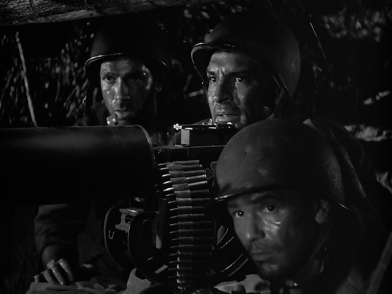 Al is assigned to Guadalcanal, where he helps man a gun crew overlooking the river. He and his two crewmates, Johnny Rivers (Anthony Caruso) and Lee Diamond (Dane Clark), are beyond exhausted, but they know there are Japanese forces across the river, so they wait, picking off enemy soldiers whenever they see them. Unfortunately, Johnny dies from a shot to the head and Lee is badly wounded in the shoulder, so it’s up to Al to man the gun by himself, and the Japanese keep coming. There are shouts from everywhere: “Marine, tonight you die!” and Al mows them down, shouting back, “Why can’t I shut you up?” in a mixture of frustration, anger and terror. Then, just as things seem to be going quiet, a Japanese soldier crawls up to the foxhole with a grenade, and the last thing Al sees is his face and the explosion.
Al is assigned to Guadalcanal, where he helps man a gun crew overlooking the river. He and his two crewmates, Johnny Rivers (Anthony Caruso) and Lee Diamond (Dane Clark), are beyond exhausted, but they know there are Japanese forces across the river, so they wait, picking off enemy soldiers whenever they see them. Unfortunately, Johnny dies from a shot to the head and Lee is badly wounded in the shoulder, so it’s up to Al to man the gun by himself, and the Japanese keep coming. There are shouts from everywhere: “Marine, tonight you die!” and Al mows them down, shouting back, “Why can’t I shut you up?” in a mixture of frustration, anger and terror. Then, just as things seem to be going quiet, a Japanese soldier crawls up to the foxhole with a grenade, and the last thing Al sees is his face and the explosion.
Blinded, Al picks up a gun, and Lee pleads with him not to kill himself. Amazingly enough, though, Al begs, “Tell me where they are, Lee! I’ll shoot ’em. Tell me where they are!”
It’s later revealed that Al was able to kill 200 Japanese soldiers under Lee’s direction, but the movie skips over the actual incident. The next thing we see is Ruth working at her office. Her Uncle Ralph calls her to let her know Al is in the Naval Hospital in San Diego. Then we see Al with his eyes bandaged, writing a letter to Ruth with the help of Red Cross worker Virginia Pfeiffer (Rosemary DeCamp). He doesn’t have much to talk about, just fluffy wait-until-I-get-my-hands-on-you generalities, mainly because he doesn’t want to tell anyone what he’s really thinking. Virginia doesn’t buy Al’s breezy act, though, and is concerned about Al hiding from his fiancé.
Al asks Virginia to be in the room with him when he gets the bandages off. He has no hope of seeing much, but he’s positive he’ll see something. And…no. The doctor shines the light full in his face, but Al is completely blind. The doctor tries to reassure him that he can adjust to being blind, that it’s not a death sentence, and Al stormily refuses to listen. Understandably, he’s devastated and scared.
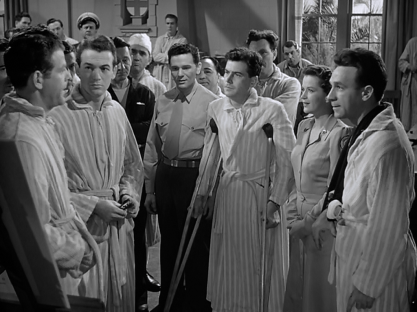 Al’s not alone in his fear. Pride of the Marines deals very frankly with the practicalities of returning to civilian life, and there’s a lengthy scene in a hospital ward in which the characters discuss some pressing concerns. Soldiers during World War Two had good reason to be nervous. After the first World War, many veterans came home to find there was no place for them in civilian life. They had no guarantee of getting their former jobs back, and they had no money. In 1924, the government promised Great War veterans a thousand-dollar bonus, to be paid in 1945, but that was cold comfort to men who were in dire straits. Their dissatisfaction culminated in a bonus march on Washington, D.C. in 1932, with little to show for their pains. World War Two veterans were afraid of history repeating itself, even though there had been reforms since 1932. Theoretically, they were supposed to get their old jobs back. They had the G.I. Bill providing them with money to help them get on their feet, with college tuition besides if they wanted it. The characters in Pride of the Marines voice some possible flaws in this seemingly ideal set-up, such as a job not existing anymore, or being pushed out by cheap labor. The film also deftly handles the barriers presented by race and ethnicity, and how many Americans felt marginalized.
Al’s not alone in his fear. Pride of the Marines deals very frankly with the practicalities of returning to civilian life, and there’s a lengthy scene in a hospital ward in which the characters discuss some pressing concerns. Soldiers during World War Two had good reason to be nervous. After the first World War, many veterans came home to find there was no place for them in civilian life. They had no guarantee of getting their former jobs back, and they had no money. In 1924, the government promised Great War veterans a thousand-dollar bonus, to be paid in 1945, but that was cold comfort to men who were in dire straits. Their dissatisfaction culminated in a bonus march on Washington, D.C. in 1932, with little to show for their pains. World War Two veterans were afraid of history repeating itself, even though there had been reforms since 1932. Theoretically, they were supposed to get their old jobs back. They had the G.I. Bill providing them with money to help them get on their feet, with college tuition besides if they wanted it. The characters in Pride of the Marines voice some possible flaws in this seemingly ideal set-up, such as a job not existing anymore, or being pushed out by cheap labor. The film also deftly handles the barriers presented by race and ethnicity, and how many Americans felt marginalized.
On the other hand, though, the film went to great lengths to reassure veterans that they always had help available. They had friends and family who wouldn’t let them be left out in the cold. It also reminded them of the power Americans have to affect positive change, and that veterans have a unique vantage point when it comes to appreciating what America is meant to be. While this aspect of the film has been criticized for slowing down the narrative, in 1945 it would have imparted important messages to returning servicemen and civilians.
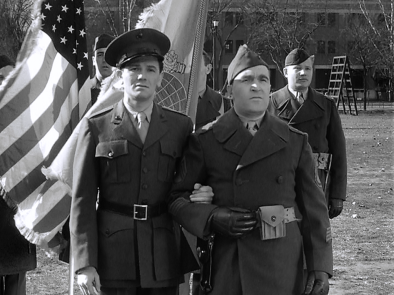 In spite of the encouragement, Al still has a lot to learn, and is hard-pressed to come to terms with his new normal. He’s sent back to Philadelphia to recover in the Naval Hospital there and receive the Navy Cross. He’s broken up with Ruth, but Virginia explains the situation to her and Ruth is determined to fight for Al. How will it all work out? Well, here’s a spoiler: The real-life Al and Ruth got married and had two sons.
In spite of the encouragement, Al still has a lot to learn, and is hard-pressed to come to terms with his new normal. He’s sent back to Philadelphia to recover in the Naval Hospital there and receive the Navy Cross. He’s broken up with Ruth, but Virginia explains the situation to her and Ruth is determined to fight for Al. How will it all work out? Well, here’s a spoiler: The real-life Al and Ruth got married and had two sons.
I honestly believe John Garfield and Eleanor Parker deserved Oscars for their performances in Pride of the Marines. Their portrayals of Al and Ruth were honest and intense, as they should have been. Not only are they incredible actors, but both Garfield and Parker spent time with the real Al and Ruth, even going to 6504 Tulip Street, where Al boarded, as well as other locations around Philadelphia. Unfortunately, the movie only got one measly Oscar nomination for Best Adapted Screenplay. My guess is that the raw emotion the cast, and John Garfield in particular, showed throughout the movie might have made Academy members uncomfortable, as actors of that day were supposed to retain at least a measure of cool. Veterans’ issues may not have been something the studios wanted to delve into all that much, anyway. The success of the few movies that were made about the aftermath of war, such as The Best Years Of Our Lives, show that there was obviously a market for these types of films. It’s too bad, it really is, because what these men faced when they came home deserved to be examined and understood by the public.
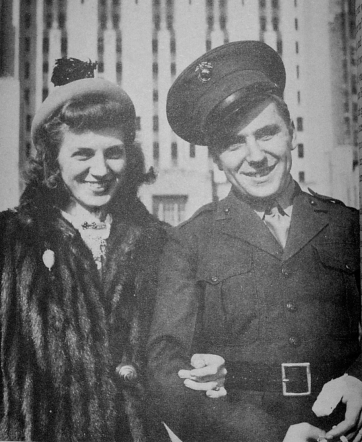
When studying history, and in particular, war, it’s easy to forget that in the shadows of the heroes and personalities, wars have been fought by countless no-names. People who will never get famous (or stay famous) are the ones who do most of the fighting and then the cleanup afterwards. It’s how life is. Fame can be highly overrated anyway, and glory-grabbing shouldn’t be a reason to fight a war. I think Al Schmid would agree. Thank heaven he was one of many ordinary guys who just happened to do something extraordinary. Pride of the Marines is a fitting tribute to Al Schmid and his fellow veterans.
That concludes Day Three. For more entries in the John Garfield: The Original Rebel Blogathon, please visit Phyllis Loves Classic Movies. Thanks for reading, and thanks heaps to Phyl for hosting. See you on March 24th for The Second Annual Bette Davis Blogathon, hosted by In the Good Old Days of Classic Hollywood! Have a great month, everyone…
This film is available on Amazon.

How have I not discovered your blog sooner?!? Great post about such an interesting time in cinematic and world history
LikeLiked by 1 person
Thank you, that’s nice of you! Glad you enjoyed it. My blog’s only been around for about a year, so it’s easy to miss, lol. 🙂
LikeLike
I was unfamiliar with John Garfield’s work until I saw PRIDE OF THE MARINES on TV back in the late ’60s — I was deeply impressed and became a Garfield fan from then on. This remains my favorite of his films (with BODY AND SOUL in second place). Like you, I think his portrayal of Al Schmid deserved an Oscar, or at least a nomination. My guess is that Warner Bros. had no interest in promoting Garfield to be nominated. His contract with them ended in 1946 and he’d stated he didn’t intend to renew it. I doubt Warners wanted him to win an Oscar at that point, since it would’ve made other studios even more eager to sign him when he became available. Ironically, a 1951 film, BRIGHT VICTORY, got Arthur Kennedy an Oscar nomination as a (fictional) blinded soldier adjusting to civilian life. I’m sure Kennedy deserved the nomination, but no more than John Garfield did in 1945.
LikeLiked by 1 person
Wow, that’s interesting. I think you’re right, though–Warner just didn’t want to back up Garfield. He even had to fight to get the movie made in the first place. I know Al Schmid liked Garfield’s performance very much, though, so that’s pretty good validation.
LikeLike
In my previous comment I totally forgot to mention how much I enjoyed all three of your posts for the John Garfield blogathon. I found all of them very well-written and insightful. And much thanks for your take on PRIDE OF THE MARINES, a film which needs to be better known among Garfield’s filmography.
LikeLiked by 1 person
Thank you, Gary–that’s nice! I’m glad you enjoyed my posts. And you’re right about “Pride of the Marines.”–it’s a shame it’s not as well-known as it deserves to be. I found out about it when I ran across the Lux Radio Theater version. Completely blew me away. 🙂
LikeLike
Thanks for sharing your research re: American G.I.s returning from the war. I can imagine that readjusting to North American life would be difficult for many – and their loved ones, too.
I’ve never seen this film, but I’m anxious to see it now that I’ve read your excellent review. Thanks for that. 🙂
LikeLiked by 1 person
You’re welcome, and definitely! It was tough for them, and Hollywood just did not want to go into what these vets were dealing with, which is too bad. Pride’s a fantastic movie–very underappreciated. Thanks for reading, glad you enjoyed. 🙂
LikeLiked by 1 person
A marvelous third entry for the blogathon. Pride of the Marines is an enduring film full of real emotion and you gave it, the stars and the Schmids a truly fitting tribute.
LikeLiked by 1 person
Thank you, Patricia–that’s nice of you. I’m glad to honor these people, even in a small way. 🙂
LikeLike
I forgot to press record the night before on this and when I realized it the next morning I was only in time to get the last half 😦
I had no idea this was a true story! I always find these kind of war movies interesting and how they treat returning soldiers(Best Years…, The Men, etc.). This sounds like a fantastic cast – love Eleanor Parker and Dane Clark). It’s a shame what movies get passed over for Oscars just because the message is uncomfortable.
Thanks so much for participating in the blogathon with this important film! Hopefully TCM will show it again in the near future 🙂
LikeLiked by 1 person
Aw, man–that’s a bummer. You’re in for a treat when you do get to see it, though. Parker and Clark do so, so well opposite Garfield. There is a Lux Radio Theater version that might fill some of the blanks until TCM shows it again. The real Al Schmid calls in at the end, which is pretty cool. And you’re welcome–thanks for hosting! It was fun. 🙂
LikeLike
TCM showed this a few days ago and I watched it today! What an incredible film. I reread your post and it truly does it honor. I often feel bad for the veterans who gave so much who are still alive that see how many people take for granted what they fought so hard for and tear each other apart instead of joining together as a truely united country. I found the scene in the hospital to be very moving, not slow at all. And I definitely teared up several times. They certainly did deserve Oscars for their performances!
LikeLiked by 1 person
Great, Phyl–that’s cool you got to see it! Thank you, I appreciate that. 🙂 And I know what you mean. So many things about now are so nasty, and they don’t have to be. It must be heartbreaking for vets to watch. I’m glad you get the hospital scene! It really lays out what these men were facing, and it had to be comforting for them. This is definitely a movie that deserves more than it’s gotten.
LikeLike
TCM showed this a few days ago and I watched it today!
LikeLiked by 1 person
Awesome–hope you liked it! 🙂
LikeLike
My favorite movie of all time. Simply one of the best movies ever made. I’ve seen all of Garfield’s films, he was one of the best.
LikeLike